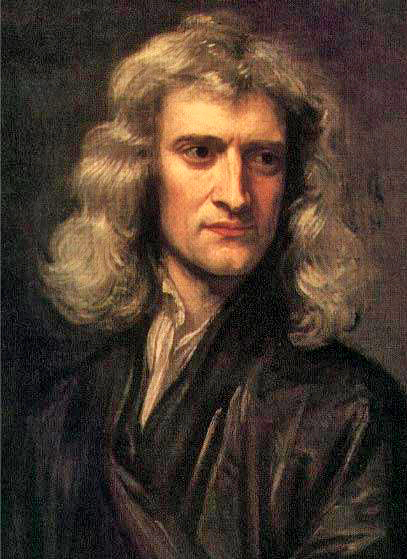Sir Isaac Newton è stato un matematico, fisico, filosofo naturale, astronomo, teologo, storico e alchimista inglese; citato anche come Isacco Newton, è considerato uno dei più grandi scienziati di tutti i tempi. Ricoprì il ruolo di direttore della zecca inglese e fu Presidente della Royal Society.
Noto soprattutto per il suo contributo alla meccanica classica, Isaac Newton contribuì in maniera fondamentale a più di una branca del sapere. Pubblicò i Philosophiae Naturalis Principia Mathematica nel 1687, opera nella quale descrisse la legge di gravitazione universale e, attraverso le sue leggi del moto, costruì le fondamenta per la meccanica classica. Newton inoltre condivise con Gottfried Wilhelm Leibniz la paternità dello sviluppo del calcolo differenziale o infinitesimale.
Newton fu il primo a dimostrare che le medesime leggi della natura governano il movimento della Terra e degli altri corpi celesti. Egli contribuì alla rivoluzione scientifica e al progresso della teoria eliocentrica. A Newton si deve anche la sistematizzazione matematica delle leggi di Keplero sul movimento dei pianeti. Oltre a dedurle matematicamente dalla soluzione del problema della dinamica applicata alla forza di gravità ovvero dalle omonime equazioni di Newton, egli generalizzò queste leggi intuendo che le orbite potevano essere non solo ellittiche, ma anche iperboliche e paraboliche.
Newton fu il primo a dimostrare che la luce bianca è composta dalla somma di tutti gli altri colori. Egli, infine, avanzò l'ipotesi che la luce fosse composta da particelle, dando vita alla teoria corpuscolare della luce, in contrapposizione alla teoria ondulatoria della luce patrocinata dall'astronomo olandese Christiaan Huygens e dall'inglese Thomas Young e corroborata alla fine dell'Ottocento dai lavori di Maxwell e Hertz. La tesi di Newton trovò invece conferme, circa due secoli dopo, con l'introduzione del quanto d'azione da parte di Max Planck e con l'articolo di Albert Einstein sull'interpretazione dell'effetto fotoelettrico a partire dal quanto di radiazione elettromagnetica, poi denominato fotone. Queste due interpretazioni coesisteranno nell'ambito della meccanica quantistica, come previsto dal dualismo onda-particella.
Occupa una posizione di grande rilievo nella storia della scienza e della cultura in generale. Il suo nome è associato a una grande quantità di leggi e teorie ancora oggi insegnate: si parla così di dinamica newtoniana, di leggi newtoniane del moto, di legge di gravitazione universale. Più in generale ci si riferisce al newtonianesimo come a una concezione del mondo che ha influenzato la cultura europea per tutto il Seicento.
Newton era attratto dalla filosofia naturale; ben presto cominciò a leggere le opere di Cartesio, in particolare La geometria del 1637, in cui le curve sono rappresentate per mezzo di equazioni. Negli anni in cui era studente a Cambridge alla cattedra presiedevano due figure di grande rilievo, Isaac Barrow e Henry More, che esercitarono una forte influenza sul ragazzo; Newton, negli anni seguenti, costruì le sue scoperte matematiche e sperimentali facendo riferimento a un gruppo ristretto di testi.
Wikipedia
✵
4. Gennaio 1643 – 31. Marzo 1727
•
Altri nomi
Sir Isaac Newton

